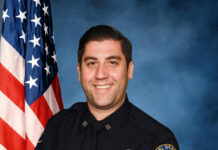Update: The Seal Beach City Council, apparently influenced by the Bridgeport Technical Advisory Commitee, expressed its support for the “dig and haul” option for cleaning up the Bridgeport neighborhood during the Monday, March 22 City Council meeting. The city has mailed a letter to the Orange County Health Care Agency stating the city’s position. Details of the council meeting will be published in the Thursday, April 1 edition of the Sun News Papers.
The Bridgeport Technical Advisory Committee announced Thursday night, March 18, that the “dig and haul” option was a better way to decontaminate their neighborhood than the chemical oxidation plan advocated by Atlantic Richfield Company/British Petroleum.
Residents who spoke at the meeting seemed to agree. One by one, residents spoke in favor of the committee’s recommendation that soil contaminated by leaks from an ARCO station on Pacific Coast Highway be removed and hauled off. None of the approximately 50 Bridgeport residents who attended the meeting at the Marina Drive Community Center supported the chemical oxidation plan laid out in the Preliminary Corrective Action Plan that ARCO submitted to the Orange County Health Care Agency in mid-February.
The purpose of the meeting was for representatives of the county health agency to hear public comments on the CAP, as well as for the advisory committee to announce their analysis of the CAP.
The ARCO Preliminary CAP listed four alternatives for cleaning up the Bridgeport neighborhood. ARCO’s preferred alternative was number three, injecting chemicals into the ground to breakdown the toxic chemicals in the soil and groundwater.
Recently, the Seal Beach Environmental Quality Control Board voted to recommend chemical oxidation to the City Council. The environmental board members believed chemical oxidation would be less disruptive to the neighborhood and less likely to add pollution to the environment than excavation of the contaminated soil, commonly known as “dig and haul.” The board’s recommendation was not legally binding on the council. Only the City Council could take an official position on behalf of the city government.
The council was scheduled to discuss the Bridgeport matter at the agency’s Monday, March 22 council meeting. Results of the meeting were not available at deadline.
Bridgeport resident Ray Zeoli presented the Technical Advisory Committee’s findings to the meeting. Zeoli said the five committee members had reached a consensus regarding the ARCO plan. “I just drew the short straw to present it,” he said.
The five committee members were all identified as Bridgeport area residents with backgrounds in environmental engineering. The other members were Mario Facoboni, Susan Perrell, Glen Barton and Nick Ta.
Zeoli said the Technical Advisory Committee came up with different answers than ARCO did. He listed the goals of the clean up project: to clean up the area as quickly as possible, to protect the health of the residents and to protect property values.
Zeoli said the quickest way was to remove the soil. However there was still contaminated groundwater in hard to reach areas under the ground. To solve that problem, the committee recommended off-site gasoline vapor extraction.
“I think we all agree the vapor extraction appears to be working,” he said.
He also said the ARCO excavation alternative did not address groundwater contamination.
He said another goal of decontamination was to reduce hydrocarbons in the soil. “You’re not going to find a more effective method than ‘dig and haul’,” he said.
Legally, ARCO was required to present a minimum of two alternatives in its Preliminary CAP. ARCO was also allowed to state its preference among alternatives. The ARCO CAP presented four alternatives, the third being chemical oxidation. The plan described chemical oxidation as a new method of decontamination.
Zeoli said chemical oxidation had a lot of promise. “We don’t want to be part of a science project,” he said.
He also said he believed ARCO overestimated the cost of “dig and haul” and underestimated the cost of the other alternatives.
Fellow committee member Perrell said no one knew how long decontamination would take. She said it could be months to two years to clean up the site.
Committee member Facoboni said something else, in addition to excavating the soil, would have to be done to treat the groundwater.
Other Bridgeport residents seemed to agree. The meeting began at 7 p.m. By 9:15 p.m., 15 had gone up to the podium to support “dig and haul.” No one at the meeting spoke in favor of another alternative. Comments made at the microphone were met with applause from the audience.
The public has until March 31 to comment on the ARCO Corrective Action Plan. Richard Sanchez of the OC Health Care Agency told the audience that in addition to sending their comments to the HCA, they should send copies of their comments to public officials at the county and state level of government.
Larry Honeybourne, program manager for the OC Health Care Agency, confirmed that ARCO could not refuse to carry out the decontamination directed by the health agency. Honeybourne said after reviewing the CAP and public comments, which would probably include an official letter from the city of Seal Beach, the health agency would direct ARCO to write a Final Corrective Action Plan and submit it for approval before beginning the clean up operation.
Honeybourne said that if the decontamination plan ARCO used did not work, the county would direct ARCO to use another alternative.












